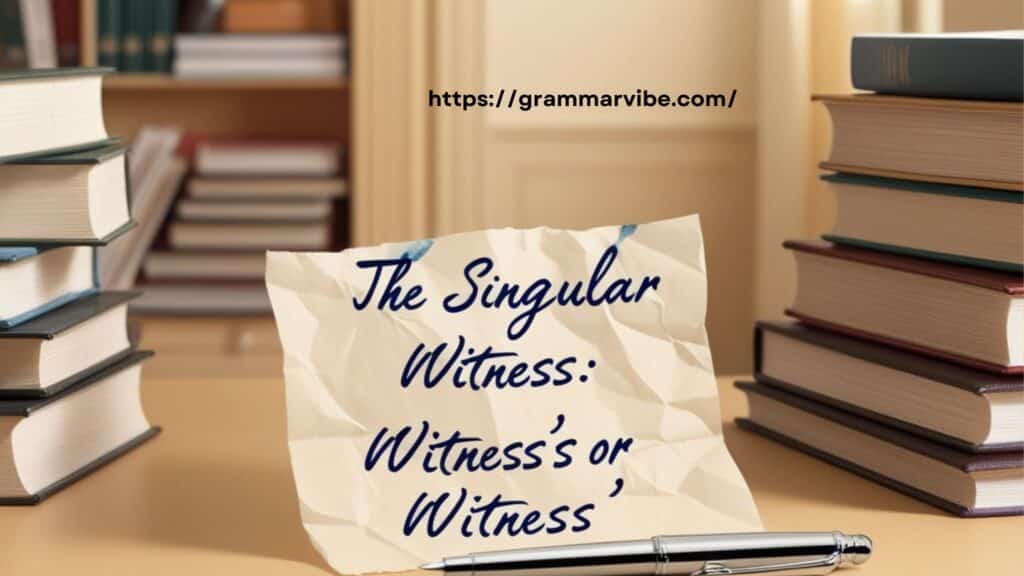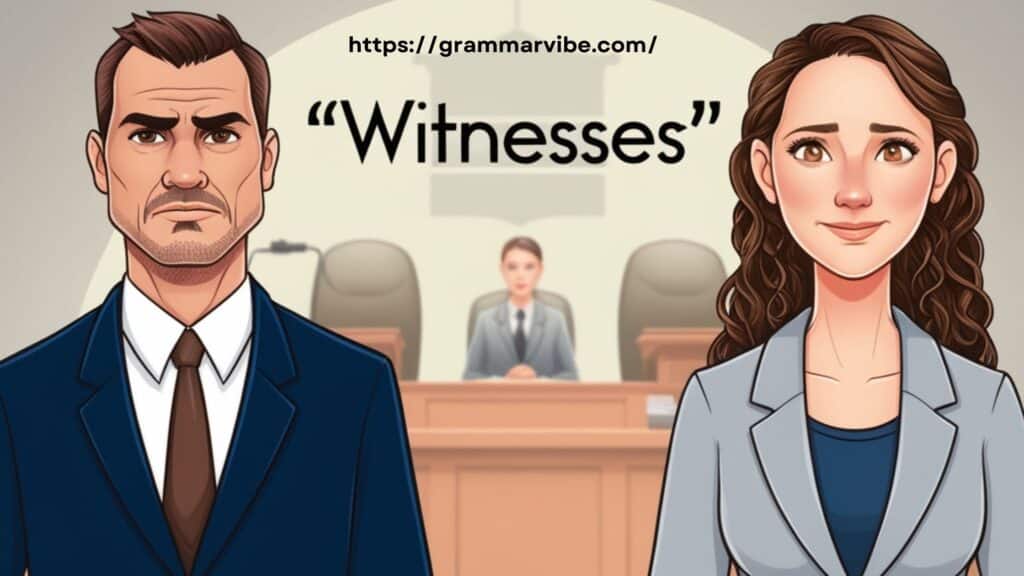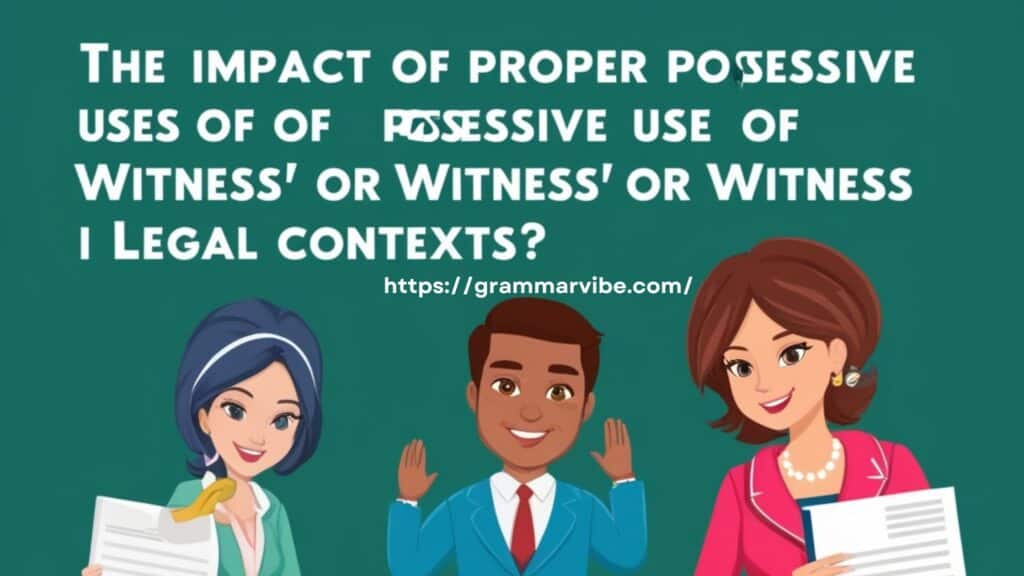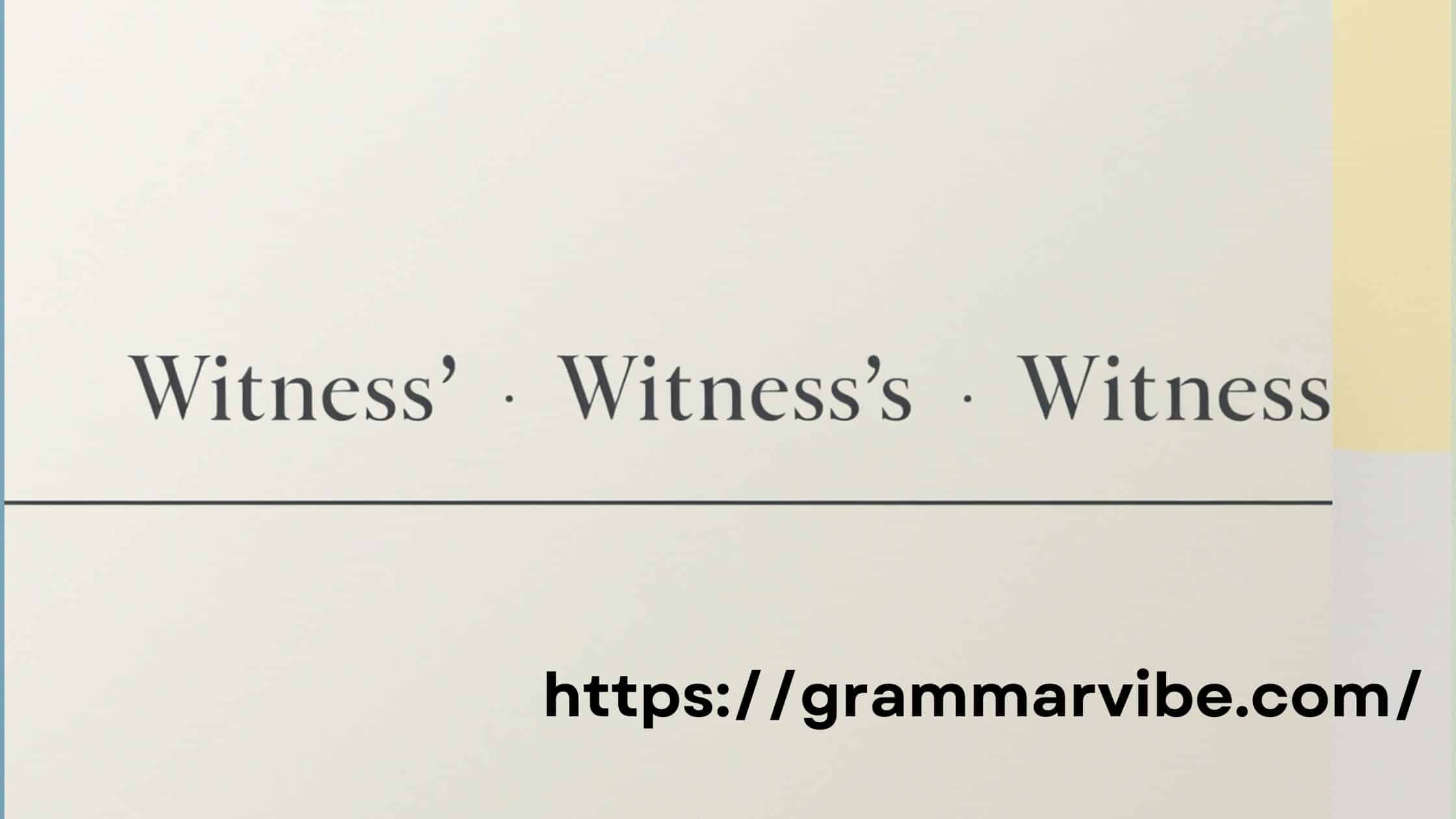In the realm of English grammar, few topics spark as much debate as the proper use of possessives. Among these, the possessive form of “witness” often leaves even seasoned writers scratching their heads. Is it witness’, witness’s, or simply witness?
Let’s dive into this grammatical conundrum and explore the various scenarios where these forms come into play, especially in the context of legal proceedings and criminal investigations.
The Singular Witness: Witness’s or Witness’?

When dealing with a singular witness, the possessive form can take two shapes: witness’s or witness’. Both are technically correct, but usage varies depending on style guides and personal preference.
Witness’s: The Preferred Form
Most modern style guides, including the Chicago Manual of Style, recommend using witness’s for the singular possessive. This form follows the general rule of adding ‘s to singular nouns, regardless of their ending.
Example:
- The witness’s testimony was crucial in solving the case.
- The detective carefully reviewed the witness’s statement before the trial.
In a legal proceeding, clarity is paramount. Using witness’s leaves no room for ambiguity about the number of witnesses involved.
Witness’: The Traditional Alternative
Some writers, particularly those adhering to older style guides, may opt for witness’. This form stems from a traditional rule of omitting the extra ‘s for words ending in an “s” sound.
Example:
- The witness’ account of the crime scene differed from the forensic analysis.
- The jury paid close attention to the witness’ perspective during cross-examination.
While less common in modern usage, this form is still acceptable, especially in more formal or traditional contexts.
You might also like Wife’s or Wives’
Plural Possessive: Witnesses’

When dealing with multiple witnesses, the possessive form becomes more straightforward. For the plural possessive, we simply add an apostrophe after the s: witnesses’.
Examples:
- The witnesses’ statements were collected at the police lineup.
- The prosecutor built a strong case based on the witnesses’ collaborative accounts.
This form clearly indicates that multiple witnesses are involved, which can be crucial in establishing a timeline of events or corroborating evidence.
Scenarios and Examples
Let’s explore various scenarios where these possessive forms come into play during an investigation and subsequent trial.
Single Witness Scenarios
- Eyewitness Testimony
- The witness’s firsthand account of the robbery proved invaluable to the investigation.
- Expert Witness
- The forensic expert’s analysis supported the witness’s memory of the event.
- Character Witness
- The defendant’s colleague served as a character witness, and the witness’s perspective shed light on the accused’s usual behavior.
Multiple Witnesses Scenarios
- Conflicting Accounts
- The detective had to reconcile the witnesses’ differing statements about the suspect’s appearance.
- Collaborative Testimony
- The prosecution’s case was strengthened by the witnesses’ consistent descriptions of the getaway vehicle.
- Witness Protection
- Ensuring the witnesses’ safety was paramount, given the high-profile nature of the case.
You might also like Luis’ or Luis’s
Common Pitfalls and How to Avoid Them
When dealing with possessive forms, especially in legal writing, it’s crucial to avoid common mistakes that could lead to confusion or misinterpretation.
Confusing Singular and Plural Forms
Incorrect: The witnesses’s testimony was contradictory.
Correct: The witnesses’ testimony was contradictory.
Remember, witnesses is already plural. Adding an extra ‘s would be incorrect.
Omitting the Apostrophe
Incorrect: The witness statement was entered into evidence.
Correct: The witness’s statement was entered into evidence.
Without the apostrophe, “witness” becomes a mere adjective, potentially changing the meaning of the sentence.
Inconsistent Usage
In legal documents, consistency is key. Choose either witness’s or witness’ for singular possessives and stick with it throughout the document.
The Impact of Proper Possessive Use in Legal Contexts

The correct use of possessives goes beyond mere grammar; it can have significant implications in legal proceedings.
Clarity in Court Documents
Precise language is essential in court. Using the correct possessive form can prevent misunderstandings about the number of witnesses involved or whose testimony is being referenced.
Example:
- “The witness’s account contradicted the defendant’s alibi.” (Clearly referring to one witness)
- “The witnesses’ accounts provided a comprehensive timeline of the events.” (Multiple witnesses involved)
Accuracy in Police Reports
When documenting witness statements during an investigation, proper possessive use ensures that the information is attributed correctly.
Example:
- “According to the witness’s description, the suspect had a distinctive tattoo on their left arm.”
Jury Instructions
When a judge instructs the jury, clear language is crucial. Proper use of possessives can help jurors understand whose testimony they should consider.
Example:
- “You must weigh the credibility of each witness’s testimony independently.”
You might also like Business’ or Business’s
Beyond the Courtroom: Possessives in Everyday Language

While we’ve focused heavily on legal contexts, understanding these possessive forms is valuable in many scenarios.
Journalism
Reporters often deal with witness accounts when covering crimes or accidents.
Example:
- “The newspaper article quoted the witness’s vivid description of the car crash.”
Academic Writing
In fields like history or sociology, scholars might analyze witness accounts of historical events.
Example:
- “The historian compared the witnesses’ recollections of the protest to official government records.”
Business Communications
Even in corporate settings, understanding possessives can be crucial, especially in documenting workplace incidents.
Example:
- “The HR department carefully reviewed each witness’s statement regarding the alleged misconduct.”
You might also like Community’s or Communities’ or Communities
Conclusion: Mastering the Art of Possessives
Understanding the nuances of possessive forms—whether it’s witness’s, witness’, or witnesses’—is more than a grammatical exercise. It’s a crucial skill for clear communication, especially in high-stakes environments like courtrooms or crime investigations.
Remember:
- For a singular witness, both witness’s and witness’ are acceptable, with witness’s being more common in modern usage.
- For multiple witnesses, always use witnesses’.
- Consistency and clarity should be your guiding principles.
By mastering these forms, you’ll enhance the precision of your writing, whether you’re drafting legal documents, reporting news, or simply striving for grammatical excellence in your day-to-day communication. In the end, the goal is to convey information clearly and accurately, ensuring that your message—like a reliable witness’s testimony—stands up to scrutiny.
Table summarizing the key points about the possessive forms of “witness”:
| Form | Usage | Example | Context |
|---|---|---|---|
| Witness | Non-possessive singular | The witness testified in court. | Used when no possession is indicated |
| Witness’s | Singular possessive (preferred) | The witness’s testimony was crucial. | Modern usage, recommended by most style guides |
| Witness’ | Singular possessive (alternative) | The witness’ account differed from others. | Traditional usage, less common in modern writing |
| Witnesses | Non-possessive plural | Several witnesses came forward. | Used for multiple witnesses without possession |
| Witnesses’ | Plural possessive | The witnesses’ statements corroborated each other. | Used for possessive form with multiple witnesses |
Key Points:
- Both “witness’s” and “witness'” are correct for singular possessive.
- “Witness’s” is more common in modern usage.
- “Witnesses'” is always used for plural possessive.
- Consistency is crucial, especially in legal and formal writing.
- Proper use ensures clarity in legal proceedings, police reports, and jury instructions.
- Correct possessive forms are important in journalism, academic writing, and business communications.
This table provides a quick reference guide to the different forms discussed in the article, helping to clarify their usage in various contexts.

Kyren Paul is an experienced blogger and the creative mind behind “Grammar Vibe.” With a passion for the nuances of English grammar, he brings clarity and insight to everyday language topics, making grammar accessible and engaging for readers of all levels.











Leave a Comment